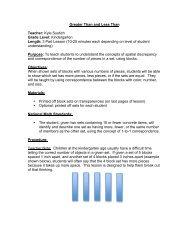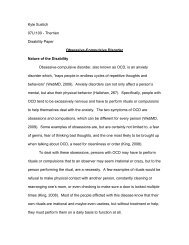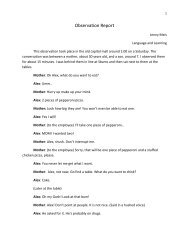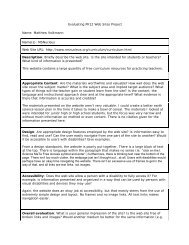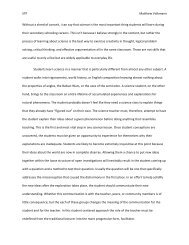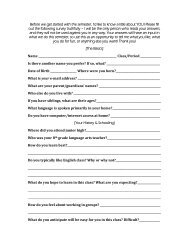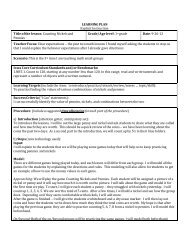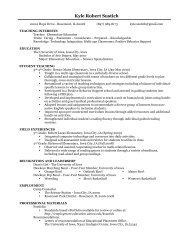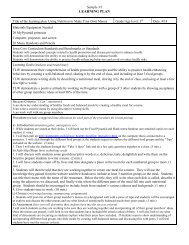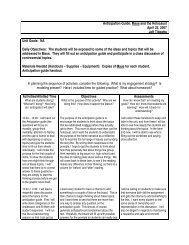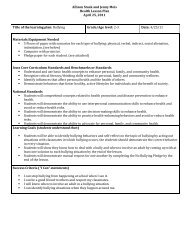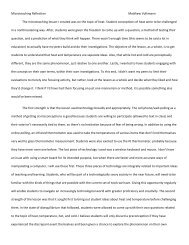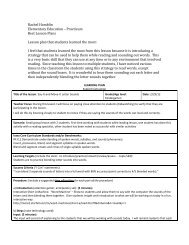Writing child study - Employment
Writing child study - Employment
Writing child study - Employment
You also want an ePaper? Increase the reach of your titles
YUMPU automatically turns print PDFs into web optimized ePapers that Google loves.
Use of writing process: during writing (consider drafting, revising and editing).<br />
Observations/examples<br />
Since I noticed from his other stories he has trouble<br />
adding detail about different elements within a story it<br />
came as no surprise to me that this story was no<br />
different. His first draft of his story was this:<br />
me my brother go down the slide at the same time<br />
won of us will get hrut my mom and dad come help<br />
us up We go home my dad das exercises we play out<br />
side and play with the leves<br />
As you can see his story had no punctuation, few<br />
capital letters, and some misspelled words. I also<br />
noticed Nadjib fails to include any dialogue into his<br />
writings.<br />
Recommendations<br />
Interpretations<br />
Since his story really only consisted of what he put down on<br />
the graphic organizer I knew he needed to expand on his<br />
ideas a great deal. Buckner expresses, “If a reader is to be<br />
able to see the story in his or her head, then someone has to<br />
create that image, and that someone is the writer” (2005, p.<br />
46). I could clearly see that Nadjib wasn’t able to see the<br />
story he was writing in his head so I knew he needed some<br />
help getting there. We used Buckner’s idea for expanding<br />
topics. I encouraged him to write as many three-word<br />
phrases as he possibly could about the topic in three<br />
minutes. It was hard for him to just use three words because<br />
he was so worried about only using the three words that he<br />
couldn’t focus on the point of the activity so I changed it a<br />
little and just had him write phrases, not mattering how long<br />
they were. The phrases kind of ended up as sentences but<br />
that was ok, the point was to expand his ideas for his story<br />
and add detail into his writing.<br />
To address the punctuation and capitalization I first started<br />
off by asking him how to correctly form a sentence. What<br />
would it need? He knew a capital letter went in the front and<br />
a period went at the end. Then we went through and fixed<br />
those parts in his story. It seems to me like he knows all the<br />
different parts in making a story like punctuation,<br />
capitalization and spelling but he doesn’t think about it all at<br />
the same time while he is writing. This is normal though for<br />
beginning writers. It’s kind of like learning to drive, you<br />
have so much to think about all at once and you aren’t used<br />
to delegating out your attention. Students this age are used<br />
to focusing on one thing at a time, like the things we teach<br />
in mini lessons.<br />
The last thing that I did with him was work on taking out<br />
unnecessary work and agreement of tenses. I had him read<br />
me his story out loud and listen for parts that didn’t really<br />
go with what his story was about or that didn’t make sense.<br />
This worked really well because when he got to the end he<br />
said, “Oh, the last two parts shouldn’t be there.” By reading<br />
it out loud to me he could hear the story and it really helped<br />
him understand what was in it that needed to be changed<br />
and what parts didn’t read the way they would be spoken.




